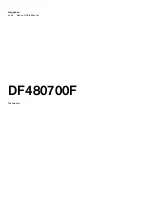
9
It is recommended that adjustments be made in accordance with the following table:
Water Hardness
Clarke
degrees
º
dH
mmol/l
Selector
position
Salt
c o n s u m p t i o n
(Grams/cycle)
Autonomy
(cycles/2kg)
0
14
M
NT
M
NIT
NIU
QIQ
NU
NQ
PS
PS
TN
QR
UV
QIR
UIV
[UV
[TN
[UIV
L
=?J?
jba
L
M
OM
QM
SM
?H?
SM
QM
OR
Level
1
2
3
4
Unscrew the cap from the salt container;
There is a ring on the container with an arrow on it (see figure to the side).
If necessary, rotate the ring in an anticlockwise direction from the " - " setting towards the " + " sign,
based on the hardness of the water being used.
When the low rinse aid indicator “ a ” is bright ,it means the rinse aid is low,you must load rinse aid.
When the low rinse aid indicator “ ” lights , you must load rinse aid .(for some models)
Rinse aid
This product makes dishes sparkle and helps them to dry without spotting. The dispenser is located on
the inside panel of the door .
Loading the rinse aid
Regardless of the type of detergent dispenser installed on your
appliance, you must proceed as indicated below when loading the
rinse aid.
To open the dispenser, turn the " 1 " cap in an anti-clockwise direc-
tion and then pour in the rinse aid, making sure not to overfill. The
amount of rinse aid used for each cycle can be regulated by turning
the "2" dose adjustor, located beneath the "1" cap, with a screwdriver.
There are 6 different settings; the normal dosage setting is 3.
Important
Proper dosage of the rinse aid improves drying.
If drops of water remain on the dishes or spotting occurs, the dosage adjus-
tor should be turned to a higher setting.
If the dishes have white streaks, turn the dosage adjustor to a lower setting.
2
1
a
en











































